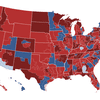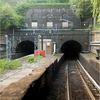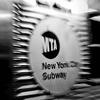Andrea Bernstein appears in the following:
Bloomberg Takes City Sustainability Program Global
Monday, November 08, 2010
New York City Mayor Michael Bloomberg Rides the Subway in Hong Kong
(Andrea Bernstein, Transportation Nation) Climate change legislation -- "cap and trade" as Republicans called it on the campaign trail -- took a serious beating last week. A bill, as you may recall, passed the U.S. House of Representatives, but went nowhere in the U.S. Senate, and prospects seem dim for federal action on climate change in the near term. Instead, the debate -- and any action -- will likely take place on the smaller stage of city halls across the nation. To underline this (and perhaps his own national ambitions) -- New York City Mayor Michael Bloomberg, who is the new head of a global cities climate "leadership group," spent time riding the subways and stumping for his cause in Hong Kong over the weekend. Here' s an excerpt of his speech:
“Let me start out by saying, my colleagues: it was just five short years ago that 18 of the world’s great cities came together, to share best practices and make common cause in the greatest global challenge of our time – and that is reducing greenhouse gas emissions that contribute so heavily to climate change.
“We all recognized that cities – where for the first time in history, half the world’s population now live and which together account for more than 70 percent of the world’s greenhouse gas production – holds the future of humanity.
52 to 45: How Republicans Shellacked Democrats
Thursday, November 04, 2010
From how Pres. Obama's party lost control of the House to why Sarah Palin isn't going away in 2012, listen as WNYC's Brian Lehrer, Andrea Bernstein, Bob Hennelly and Azi Paybarah chew over the election results in this 2010 swan song edition of Digesting Politics.
Political Road Trippers Reflect on the Election
Thursday, November 04, 2010
Now that the election is over, Joe Klein, TIME political columnist, Andrea Bernstein, WNYC reporter and director of the Transportation Nation blog, and Farai Chideya, host of Pop + Politics reflect on their political road trips around the country.
Transportation Nation: Voter Rejection of Spending Clouds Transpo's Future
Wednesday, November 03, 2010
Voter Rejection of Spending, Debt Cloud Transpo's Future
Wednesday, November 03, 2010
John Hickenlooper, the Governor Elect of Colorado and a transit advocate, one of the few Democrats who bucked the Republican tsunami in 2010
(Andrea Bernstein, Transportation Nation) In Florida in 2008, African Americans waited in lines for hours for the chance to elect the first black President. Sometimes old, sometimes infirm, sometimes young and busy, they still waited. But since then, many of them lost their homes, and in 2010, many weren't voting at all. That's what campaign volunteer Marcia Richardson told me outside a virtually empty early polling place on Martin Luther King boulevard in Tampa last week.
Turns out they never came. On The Takeaway this morning, Emery University Professor Audra Gillespie noted, "Overall, nationally African-American vote share in the entire electorate actually fell not just from 2008 but also from 2006."
This was just one of the contributing factors to the Democrats massive losses last night. It wasn't just that President Obama had riled up his opponents. It was that he'd deeply disappointed many supporters, again and again.
Transit Tax ballot measure looses in Florida; House Transportation Chair Ousted
Wednesday, November 03, 2010
(Andrea Bernstein, Transportation Nation) Some preliminary results: The Hillsborough transit tax lost 3 to 2. Early this morning, House Transportation Chair Jim Oberstar narrowly lost to Republican Chip Cravaack. High speed rail opponents Scott Walker (Wisconsin) and John Kasich (Ohio) won, and Rick Scott (Florida) is ahead, though that race hasn't been called.
High speed rail proponent Jerry Brown wins in California, and transit advocate John Hickenlooper will be the next Colorado governor.
More results, and analysis, later.
Hope turns to Nope, No Dope
Wednesday, November 03, 2010
That's tonight's headline. Complete wrap-up on how transpo measures failed tomorrow on TN -- AB
Transit Advocate Hickenlooper wins in CO
Tuesday, November 02, 2010
Blue patch in a red quilt
Come livechat the results with us
Tuesday, November 02, 2010
I'm part of the WNYC chat team watching the results. Come join our chat here. -- Andrea Bernstein, TN
Experiment in New York with Private Replacement for Public Transit? Notsogood
Tuesday, November 02, 2010
A dollar van on Bushwick Avenue (Photo by Stephen Nessen)
When New York City eliminated dozens of bus routes this June -- the largest such cutbacks in more than a generation, the city's Taxi and Limousine Commission thought it could help by quickly licensing private commuter vans to take over those routes. But it turns out for whatever reasons -- already low ridership on those routes, public unfamiliarity with the private vans, a $2 charge on top of any connecting subway fares -- drivers are now abandoning those routes. Matthew Schuerman has the full story, here.
Transportation Nation: In a Climate of Cutbacks, Voters Wary of New Transit Projects
Monday, November 01, 2010
Wariness about spending on transportation and infrastructure accompanies voters to the polls
Monday, November 01, 2010
Denver Poster on Fare Hikes
(Andrea Bernstein, Transportation Nation) It's been a rough election season out there. Unless you've crawled into a cave for the last three months, you know the airwaves have been flooded with ads calling candidates everything from thieves to hooligans to rogues and everything in between. But the sour voter mood isn't just about advertisements -- it's about reduced circumstances, drastic cuts in local government services, higher taxes and fees, fewer jobs, and dramatically higher health care costs -- despite health care reform and an $800 billion stimulus bill.
Or as one Florida election volunteer Marcia told me in a largely African American neighborhood in Tampa last week: "People are disappointed," she said. "They thought they were going to have this magic wand that I'm going to save my home because we have Obama as President. And I'm going to have a job because we have Obama as President." But then, people lost their jobs, and they lost their homes.
"Where's the change?" retired Hoovers vacuum worker Alice Prestier asked me in Canton, Ohio. Or, more bitterly, as one Colorado contractor told me in Loveland, Colorado: “I don’t need to spend $2,000 to support every illegal f*****g Mexican in this country. Nor do I need to keep busting my ass for this government. You know, my son can’t ride the bus to school anymore. He’s got to walk two miles to school, explain that to me! You know, why does education have to go, but yet we can support illegals, we can piss money away on stuff that doesn’t’ matter, a health care plan that will never work?"
All of which has created a wary public, seemingly unwilling to spend on big transit projects like the ARC tunnel, high speed rail, or even roads. Even though the President has bracketed this campaign season with a call for $50 billion in additional spending on roads, rails, and airports and the distribution, last week, of some $2.5 billion in high speed rail grants, kitchen-table cut backs have spilled over into an attitude about government spending. Where once voters seemed to have faith that large infrastructure projects would create jobs, both in the long and short terms, they now worry that worthy as projects may be, there simply isn't enough money to spend on things like new transit tunnels, high speed rail systems, or even roads.
The Democratic Senate candidate in Colorado, Michael Bennet, was an early defector from the Obama Labor Day plan, and voters -- Republicans, Democrats -- told me that was "about right."
“It should all be fixed,” Debbie Horoschock told me at the Wilkes-Barre farmers market in late September" of the president’s proposal to spend money fixing rail, roads, and airports. So she thinks that would be a good thing to spend money on? “No. But they should be fixed.” How are they going to be fixed without money? “I don’t know how they are going to be fixed without money. But we need money to fix the damn roads.”
High speed rail, actually pilloried by some candidates (Scott Walker in Wisconsin, Rick Scott in Florida, John Kasich in Ohio) gets a lot more raised eyebrows. "They just shouldn't be spending on that project," one Ohio retiree in downtown Canton who wouldn't give her name told me. Even if that meant losing hundreds of millions of federal money coming straight to this depressed area? "Even so."
There are some bright spots for those who support big transit projects. In Colorado, the Democratic Gubernatorial candidate, John Hickenlooper, who made his bones pushing a sales tax for transit when he first became Mayor of Denver, in 2004, is leading in most polls, and his support of a sales tax is drawing some crossover support. And in Tampa, a similar measure is intriguing some voters who are supporting Marco Rubio, the Tea Party-backed candidate for U.S. Senate. The logic seems to be in how the tax is paid--it's a pay-as-you-go tax, not a large, one-time, acquisition of debt, much disfavored this election year.
Transportation Nation has been out in swing counties this election season. What we've learned about how America wants to build its future has been surprising, enlightening, sometimes harsh, and always deeply, deeply educational. Everyone looking at how government should address these questions in the next Congress should be reading these posts. In order of our visits:
Transpo History Buffs, Where is this?
Monday, November 01, 2010
Photo: New York Times
The New York Times has an incredibly cool article about an art installation in an abandoned -- or unfinished -- subway stop (photo above). The location of the stop is carefully concealed at the request of the artists. But there's a pretty big clue, in the photo above. Any subway history buffs or infrastructure experts reading this who have ideas where it is? Post a comment, or email us at transponation@gmail.com.
NY Gubernatorial Candidate Cuomo releases Green Agenda
Saturday, October 30, 2010
 (Andrea Bernstein, Transportation Nation) -- Four days before election day, Democratic Candidate for NY Governor Andrew Cuomo released a green agenda. It's slighter than some of his other agenda books -- about half the size of his urban agenda -- but it does contain both an endorsement of construction of "sustainable communities" -- a big agenda item of the Obama administration, and a call for "improved public transportation" as part of an environmental agenda. Here's what he has to say about public transportation (in its entirety.)
(Andrea Bernstein, Transportation Nation) -- Four days before election day, Democratic Candidate for NY Governor Andrew Cuomo released a green agenda. It's slighter than some of his other agenda books -- about half the size of his urban agenda -- but it does contain both an endorsement of construction of "sustainable communities" -- a big agenda item of the Obama administration, and a call for "improved public transportation" as part of an environmental agenda. Here's what he has to say about public transportation (in its entirety.)
We must Encourage Alternative Vehicles and Public Transportation. Technology has made it possible for cleaner, greener modes have transportation. From high speed rail to other alternative forms of transportation that reduces pollutants, the State should encourage the research, development and manufacturing of alternative modes of transportation. Such investment is a positive step for the environment and economic development. Moreover, the State must continue to invest and improve public transportation in order to improve the environment.
He does not address the transit financing issue that came up at the press conference releasing his urban agenda.
There's also a section on sustainable communities, which hews closely in philosophy to the Ray LaHood-Shaun Donovan-Lisa Jackson (DOT-HUD-EPA) effort.
You can read that part, after the jump.
Are Democrats Caught in a Heffalump Trap?
Friday, October 29, 2010
In this anti-incumbent year, can Democrats turn out their base across the country and hold on to their advantage in the House? Listen as WNYC's Brian Lehrer, Andrea Bernstein, Bob Hennelly and Azi Paybarah discuss the latest in key races in New York State and around the country.
Election Report: In Tampa Area, Independents and Republicans are Drawn to Transit Tax, BUT....
Friday, October 29, 2010
(Tampa, FL -- Andrea Bernstein, Transportation Nation) It's hard to imagine, that in this year, in these times, there's a measure anywhere that asks voters to approve a new tax. But in the Tampa, Florida, area there's actually a referendum on the ballot, asking voters for an extra penny for every dollar they spend to build a local transit system and improve area roads.
Tampa's county -- Hillsborough -- is a key swing county (it voted for both Obama and Bush) in a key swing state, so the outcome of the vote here will no doubt be studied by Mayors and transit planners for evidence of how to fund cash-strapped transit systems for years to come. 
Some other context about Florida -- for years the state was a boom state, fueled largely by housing construction. But that market, as you know, tanked. Unemployment is now at 12 percent, one of the highest in the nation. The African-American community, which helped fuel Obama's victory here two years ago, has been particularly hard hit. Over by the C. Blythe Andrews Jr. public library, Sadiqa Muqaddam told me his story -- he'd been working as a welder for forty years, starting at a shipyard in Pascagoula, Mississippi.
"One day I was going all over the state of Florida. I was working out of Fort Lauderdale, Orlando, everywhere, I was everywhere, you know? And now, when I look around, there's no jobs. There's no jobs." In the last year, Muqaddam lost his home. "I'm renting, now I'm back renting. Before I used to own. I'm used to walking in my three bedroom house, two jobs, my little Chihuahua. I don't have that no more. Even my dog died. Lost my cars, everything."
"I got the raggediest car out here."
I Ask Muqaddum about the transit tax, and at first, he's dubious. "We don't have -- It's just like you're taking, you know, we ain't got. And then the little bit we do got, you're taking, you know."
I push Muqaddum, asking, as I frequently do, about the opposing view.
I say, "Some people say well, it's going to help create jobs, particularly in what you do, welding, construction."
"Maybe," he says "Maybe down the line."
Listen to the full conversation with Muqaddum.
In the past, sales tax ballot measures have proven successful -- Charlotte funded their LYNX light rail system with a 1998 ballot measure for a half-cent tax that was again supported by voters in a 2007 measure championed by Republican Mayor Pat McCrory, and in Colorado, where the Denver Mayor, John Hickenlooper, now running for Governor, -- got a ballot measure passed in some 32 counties in 2004, the year Goerge W. Bush won the state of Colorado for a second time.
And here too there are independents and Republicans who believe in this initiative. One man, who didn't want his name used because he works for a large non-profit, told me he had voted for the Tea Party-backed Marco Rubio for U.S. Senate, but also for the transit tax.
30 Issues: The MTA
Friday, October 29, 2010
Gene Russianoff, staff attorney at the NYPIRG Straphangers Campaign, and Andrea Bernstein, WNYC reporter and director of the Transportation Nation blog, talk about what the elections might mean for the MTA.
Why has LaHood decided to argue his case after the ARC tunnel verdict was rendered?
Friday, October 29, 2010
 (Andrea Bernstein, Transportation Nation) In his blog today and in a full-throated op-ed in the Newark Star-Ledger, U.S. Transportation Secretary Ray LaHood gives a passionate eulogy to the ARC transit tunnel that was to go from New Jersey to Manhattan, but was killed this week by NJ Governor Chris Christie. Workers are now refilling the dirt in the giant hole. LaHood said today:
(Andrea Bernstein, Transportation Nation) In his blog today and in a full-throated op-ed in the Newark Star-Ledger, U.S. Transportation Secretary Ray LaHood gives a passionate eulogy to the ARC transit tunnel that was to go from New Jersey to Manhattan, but was killed this week by NJ Governor Chris Christie. Workers are now refilling the dirt in the giant hole. LaHood said today:
Gov. Chris Christie’s decision to terminate America’s largest transportation project was particularly disappointing. Unfortunately, his choice comes with profound consequences for New Jersey, the New York metropolitan region and our nation as a whole.
Tens of thousands of jobs that the tunnel would have created will be lost. Future New Jerseyans will face shrinking property values, suffocating road traffic, interminable train delays and increasing air pollution. A $3.358 billion federal investment in the region’s economic future will move elsewhere.
The caption to the photo above (of the portal to the current, lone, Hudson river train tunnel) asks "is this really the symbol we want for America's infrastructure?"
But in the roughly six weeks between when Governor Christie first ordered the tunnel reviewed -- and even after LaHood had flown to Trenton to try and turn Christie around, Ray LaHood was almost entirely mum. After meeting with Christie three weeks ago, he brushed past reporters. His office issued only a terse statement that day, saying he'd had a "good discussion," with Christie, and proposals would be reviewed. Last week, while at a ceremonial ground-breaking at New York City's Moynihan station, LaHood was simiarly terse.
"He and I agreed that over a two week period, we would put together a plan for a path forward and we will be meeting with him at the end of the two weeks and presenting that information."
Meanwhile, Christie was defining the narrative, speaking about the ARC tunnel both at official Trenton events and while out stumping for fellow Republicans.
But the U.S. DOT wasn't talking, at least not publicly.
Then, last Friday the U.S. DOT issued its first extensive release on the project. From LaHood:
"In response to press reports, I want to clarify the range of numbers regarding the ARC tunnel project.
“The Department of Transportation has estimated the low-range cost of the project at $9.775 billion. The mid-range estimate is $10.909 billion and the high-end range is $12.708 billion.
The release seemed to confirm that New Jersey taxpayers would be stuck with a very large bill, much larger than the state's $2.7 billion commitment.
But behind the scenes, LaHood was working furiously, and preparing for another face-to-face meeting with Christie. It turns out that the federal government had developed a number of serious, substantive proposals for Christie. They included, as we were to learn:
Obama Administration Announces Big Spending Package on Transportation
Thursday, October 28, 2010
Transportation Secretary Ray LaHood's expected announcement of billions of dollars in federal grants for high speed rail today is beginning on a sour note. New Jersey Governor Chris Christie announced yesterday that he is stopping construction of an $8.4 billion Hudson River rail tunnel connecting New Jersey and New York. Citing billions of dollars of expected cost overruns, Christie says his "decision is final." This comes after LaHood made a personal appeal to Christie, and negotiations between the Obama and Christie administrations.
With Republicans running against President Obama's stimulus, an issue that's resonated with voters, LaHood's announcement comes at a questionable time. There will be events in Iowa, Michigan, California. There's also money for Connecticut and Florida. These are all states with close races. How is this going to affect the midterm elections?
Districts in Play: What is the Forecast for the Sunshine State?
Tuesday, October 26, 2010
Voters in Florida have been party to two unusual races this election season. The Senate race has the incumbent Republican Governor Charlie Crist is in a three-way race as an independent against Tea Party-supported Marco Rubio and Democratic Congressman Kendrick Meek.
Vying for the governor's office are Republican candidate Rick Scott, running head to head against the state's chief financial officer, Alex Sink, the only Democrat to come this close to the office in decades, in a race that has the candidates accusing one another of fraud.
This against a backdrop of a state in dire straits. Florida's unemployment is fourth highest in the country at 11.9 percent, the foreclosure rate is second highest in the country. More than 20 percent of the state's residents are uninsured.












